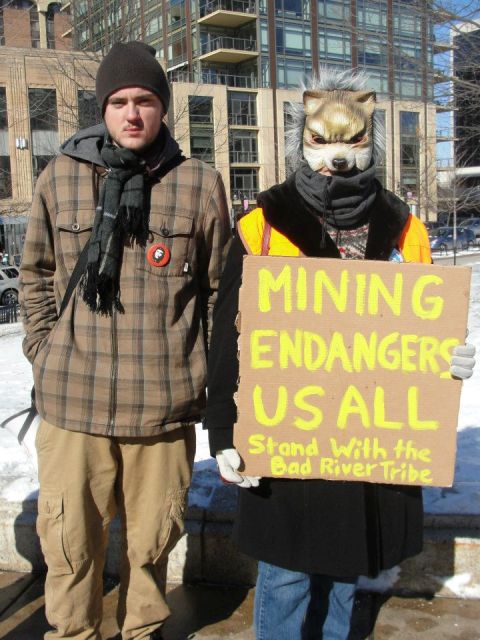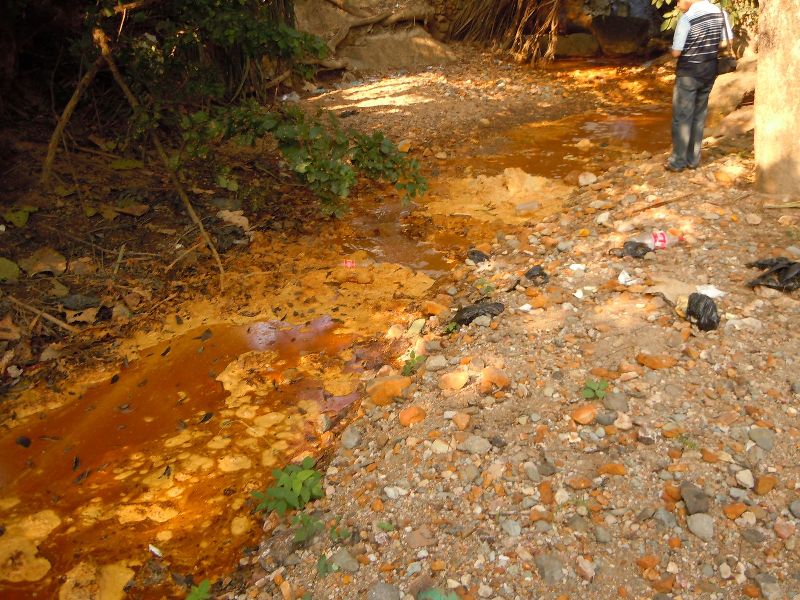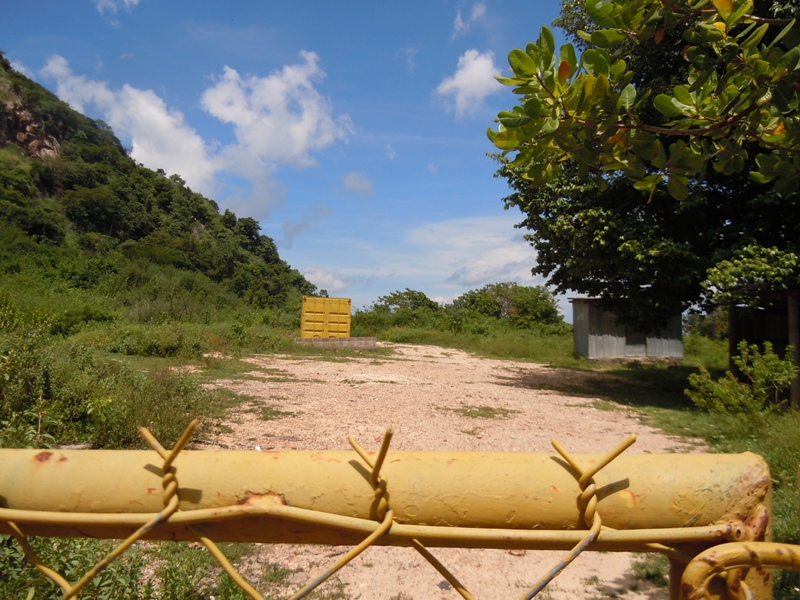The Rights Clash
- Details
- Published: Monday, 15 July 2013 20:01
By Danielle Marie Mackey
First published in: http://www.guernicamag.com/features/the-rights-clash/
Mining in El Salvador exposes the contradiction between human rights and corporate rights under the international investment regime.
 Images by Danielle Marie Mackey
Images by Danielle Marie Mackey
“This is practically an urban country. We’re talking about putting a mine in the middle of a city,” exclaimed Fr. Jose Maria Tojeira from the stage. “Imagine mining in the middle of New York or Paris. That’s what they want to do here in El Salvador. This is… crazy.”
Fr. Tojeira, the ex-rector of one of the leading universities in El Salvador, was giving a presentation during the international “Gold Mining and the Defense of Water in El Salvador” conference that took place in May. The country is embroiled in a battle on the subject: civil society is demanding that the Congress pass a law banning metallic mining, while two North American mining companies are suing the Salvadoran government to defend their right to mine.
Save the Mining Moritorium
- Details
- Published: Saturday, 05 January 2013 11:29
The state of Wisconsin’s mining legislation is some of the strongest in the country and the world. Their “prove it first” law requires mining companies to show that mining in metallic sulfides has been done safely elsewhere in North America, and since no mining company has been able to prove such a project exists, there have not been any mining projects approved in Wisconsin.
 However, now, that legislation is under attack by WI Governor Scott Walker, supported by mining company representatives. Environmental, Indian, and community organizations from across the state are organizing and fighting back to keep the regulations that have protect their water and cultural identity.
However, now, that legislation is under attack by WI Governor Scott Walker, supported by mining company representatives. Environmental, Indian, and community organizations from across the state are organizing and fighting back to keep the regulations that have protect their water and cultural identity.
Now they need your support. Below is a call for support from the Wisconsin Resource Protection Council and the Sierra Club-John Muir Chapter.
For more information on: the WI Mining Moratorium Law, Strip Mine Legislation, the Iron Mining Industry’s Environmental Track Record, and recent press coverage of the issue.
See the full text of the letter here.
Dear Environmental and Conservation Colleagues,
We're writing to ask you to consider signing your organization on to the sign-on letter (below) that will be sent to Wisconsin legislators in both houses by mid-January. The letter asks the legislators to reject special interest legislation gutting Wisconsin mining law to enable a single destructive iron ore mine. Similar legislation was defeated by a single vote in 2012. It also asks the legislators to protect Wisconsin's Mining Moratorium law that simply requires a mining permit applicant to prove that mining in metallic sulfides has been done safely elsewhere in North America. We wish to communicate this message as early as possible in the new session to both new and returning lawmakers for their education.
We request that you let us know by January 11, 2013 if your organization can sign on to this letter. Many of you took strong stands in favor of the Moratorium and against AB 426 (the ferrous or iron mining bill) in the past and we hope you will reaffirm these positions via this letter. Note that nothing you do via this effort limits anything you may wish to do as an organization to fight iron mining legislation or defend the Moratorium; in fact, we hope that you will wish to continue and increase your independent efforts in the new legislative session.
The letter will be delivered to legislators soon after the deadline and will be accompanied by the three companion briefing papers about the Mining Moratorium Law, proposed Iron Mining legislation and the Environmental Track Record of Taconite (Iron) mining. The briefing papers will also be posted to the Sierra Club's website at: http://wisconsin.sierraclub.org/PenokeeMine.asp. Please feel free to post them to your website as a resource for more information or for your own education. You can also learn more by going to Wisconsin Resources Protection Council's site at: www.wrpc.net.
If your organization can sign on the letter, please reply by January 11, 2013 with your organization's name, address and the name and title of the contact person for your group. Please contact Elizabeth Ward at the Sierra Club - John Muir Chapter office at 608-256-0565 or elizabeth.ward@sierraclub.org with any questions or concerns.
Thank you!
Al Gedicks
Executive Secretary
Wisconsin Resources Protection Council
Dave Blouin
Mining Committee Chair,
Sierra Club - John Muir Chapter
Co-founder and Board Member: Mining Impact Coalition of Wisconsin and thePenokee Hills Education Project
See the full text of the letter here.
Concerned Citizens from Across the U.S. Call on a Milwaukee Company to Act Ethically
- Details
- Published: Wednesday, 21 November 2012 16:48
Concerned Citizens from Across the U.S. Call on a Milwaukee Company to Act Ethically
A Milwaukee Company’s Toxic Legacy
In 2006, the Salvadoran government decided to revoke the failed Milwaukee-based mining corporation Commerce Group’s mining permits following evidence that the mining project had contaminated local water with highly toxic metals. After decades of gold mining, the Commerce Group mine site has been called an “environmental nightmare.”
In 2012, the Salvadoran Ministry of the Environment (MARN in Spanish) found that the river flowing by the Commerce Group mine site has nine times the healthy limit of cyanide and one thousand times the Salvadoran standard for lead in water for human consumption. Local residents are forced to buy water and collect rain water in order to meet their basic needs, and there reports that show severe health problems in the community resulting from exposure to heavy metals.
Recently, Jim Kuipers, an engineer who consulted for Commerce Group in El Salvador in the 1990’s, released a shocking statement claiming Commerce Group bribed local officials in order to get around environmental regulations. Also, in October, the MARN announced it is beginning to investigate the sources of contamination in San Sebastian. According an article published in the Salvadoran press, the Vice-Minister for the MARN said the mining operations carried out by Commerce Group will be subject to investigation.
In 2009, the Commerce Group, filed a $100 million lawsuit in retaliation against the government of El Salvador under the foreign investor “protections” contained in the Central America Free Trade Agreement (CAFTA). The Commerce Group demanded payment not only for its investments, but also the right to reopen the mine against the government’s wishes. On March 14, 2011, Commerce Group lost their case. However, the government was still forced to pay $800,000 to cover the tribunal’s costs in addition to their own legal fees.
Unsatisfied with the decision, Commerce Group filed for an annulment of the decision, but later claimed they had difficulty paying the $150,000 in tribunal fees. It seemed the case would be thrown out due to lack of payment, but on the final day before their case was closed, the company scrapped the fee together. The annulment hearing is expected for sometime in January.
In a recent tour to the United States members of the National Roundtable against Metallic Mining and Caritas talked about the effects of mining and the Commerce Group’s actions in Cleveland, St. Louis, Milwaukee, Madison, Eau Claire, Chicago, Washington D.C. and Georgia. They also circulated a petition (below) that is being promoted by faith-based organizations from across the U.S. that asks the Commerce Group to drop its multi-million dollar suit and take the steps necessary for environmental cleanup in the community of San Sebastian. A Spanish version of the letter is here.

For all people of faith, our primary commitment is to love one another as God loves us. That principle applies to our business dealings, as thoroughly as to other aspects in our lives. In other words: There is no sphere of life excluded from moral scrutiny and the economic sphere is no exception.
We, the undersigned people of faith, implore the Milwaukee-based Commerce Group to weigh the ethical and environmental consequences of pursuing further mining in San Sebastian, El Salvador, to take responsibility for the environmental contamination and to drop its case in the International Centre for the Settlement of Investment Disputes against the Salvadoran government under the Central American Free Trade Agreement (CAFTA).
Trade itself may violate the dignity of others, or, it may protect the dignity of all human beings, thus becoming an “instrument for good,” as Norwegian theologian Atle Sommerfeldt teaches. It may generate wealth for a few, or, create responsible work for many while still protecting the earth.
We urge you to do the latter.
More than a hundred years of mining at the San Sebastian gold mine in El Salvador reportedly resulted in severe environmental contamination and public health problems in the surrounding community and in nearby watersheds. In 2012, confirming investigations and complaints made by civil society, the Salvadoran Ministry of the Environment found that the San Sebastian River had nine times the acceptable limit of cyanide and one thousand times the compulsory standard for water for human consumption of iron. Local environmental organizations attribute this contamination to acid mine drainage leeching from mining waste and it is currently under investigation by the Salvadoran government.
As a result of two separate environmental audits, the Salvadoran government revoked the Commerce Group’s mining permit on Sept. 13, 2006. Now, taking advantage of “foreign investor protections” in CAFTA, the U.S. company Commerce Group is suing the Salvadoran government for $100 million. The tribunal hearing the case ruled in favor of the Salvadoran government in March, 2011, yet Commerce Group has filed for an annulment of that decision.
Communities of faith are deeply concerned about the impact of metallic mining on public health and on the environment, as well as on the escalating number of transnational corporations turning to international arbitration tribunals to resolve disputes over resource rights.
In 2007, the Episcopal Conference of El Salvador stated that “[…] we affirm that, by putting human life in danger, even though there might be economic benefits, precious metal mining should not be allowed in El Salvador. There are no material benefits that may be bought with the value of a human life.” Further, Roman Catholic and Lutheran churches, as well as faith-based organizations, in El Salvador recently issued a statement saying that the “voracity of national and transnational corporations in order to establish environmentally devastating projects, makes us extremely vulnerable to Climate Change.”
The signatures below call on the Commerce Group to take immediate steps to rectify the existing contamination in San Sebastian and to drop its case against the Salvadoran government. Decisions made to increase short-term profits will have long-term consequences for the lives of very vulnerable people.
Signed,
De dónde sacó el dinero Commerce Group
- Details
- Published: Tuesday, 21 August 2012 09:57
¿De dónde sacó el dinero Commerce Group?
Lo último que se supo fue que la compañía minera de Milwaukee, Estados Unidos: Commerce Group, estaba esforzándose para conseguir los US $ 150,000 para pagar el proceso de apelación en el caso contra el Estado salvadoreño. Mientras se acercaba el día 19 de julio, fecha límite establecida por el Tribunal que está conociendo el caso, y Commerce Group no daba señales de poder pagar, parecía que el caso estaba, sin lugar a dudas, terminado.
Sin embargo, para sorpresa de aquellos que han monitoreado el caso, Commerce Group logró reunir el efectivo y pagó al Centro Internacional de Arreglo de Diferencias relativas a Inversiones (CIADI) el último día hábil, según informan funcionarios salvadoreños. Cuatro días después, el CIADI anunciaba que el caso se retomaba.
La pregunta que sobreviene es ¿De dónde sacó Commerce Group el dinero para continuar?
En noviembre de 2011 la compañía envió una carta al CIADI aduciendo que eran incapaces de pagar la relativamente pequeña garantía y además osaron en solicitar al CIADI que obligara al Estado salvadoreño a pagar los casi US $ 70, 000 de sus gastos, señalando que el Gobierno les debía dinero fruto de impuestos pagados en exceso y por un depósito por la renta de inmuebles. La compañía no ha reportado ningún ingreso desde el año 2002 y ha estado descendiendo en su nivel de gasto de operaciones a lo largo de los años, presumiblemente mientras sus finanzas disminuyen. Por lo tanto, si la compañía realmente está en situación desesperada que mencionan, y sus finanzas lo refuerzan ¿De dónde salió el rescate?
Commerce Group inició la demanda contra el Estado salvadoreño en 2009, demandando $100 millones de dólares en compensación de contribuciones a través de impuestos. Aunque la prueba científica es amplia, e incluye estudios recientes del Ministerio de Medio Ambiente que muestran la contaminación por cianuro y hierro en el agua local, Commerce Group argumenta que al negarle los permisos, el Gobierno salvadoreño está violando sus derechos de inversión. El caso ha llamado la atención internacionalmente como un ejemplo de los peligros de las cláusulas Inversor-Estado de los Tratados de Libre Comercio. La Coalición del Centro-Oeste de Estados Unidos contra la Minería Metálica llamó a la demanda “el cínico intento de una empresa fracasada de aprovecharse de Tratados Comerciales internacionales para hacer dinero que han sido incapaces de obtener por medios legítimos.

Una foto reciente del Sitio Abandonado de Commerce Group
